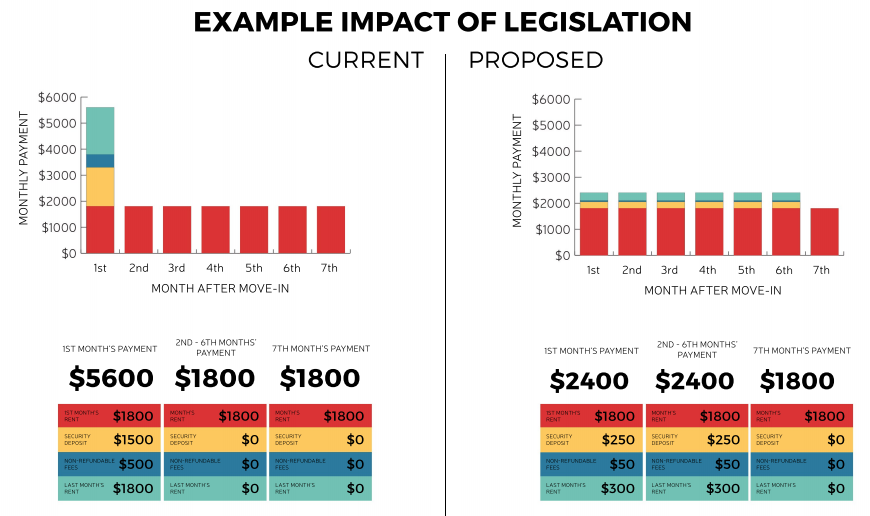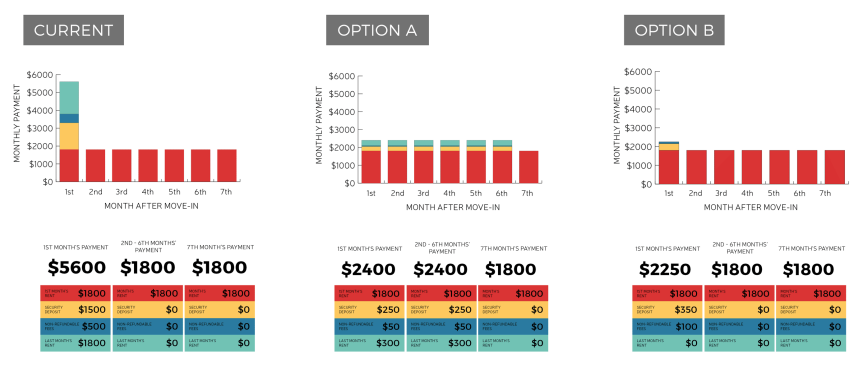The Seattle City Council adopted new tenant rights in December. The meat of the new tenant rights was a cap on move-in fees, which would also require most landlords to offer a six-month installment plan to reduce the upfront burden that move-in fess can have on tenants.
The legislation had been on track for approval by the City Council in October, but in the eleventh hour concerns over some aspects of the proposal were raised by Councilmembers, despite unanimous support in committee. The legislation was ultimately referred back to committee for further review and amendment under the condition it appear before Councilmember Kshama Sawant’s Energy and Environment Committee on or before December 13th. The intent of the timeline was to allow time for completion of the annual budget review and approval, the Thanksgiving holiday, and giving adequate buffer time for final passage prior to the new year.
October Move-In Fee Legislation
In a previous rundown, I highlighted the key aspects of the move-in fee legislation:
Tenants can elect to pay move-in fees as installments instead of one bulk payment as part of securing a unit or paying the first month’s rent. The scheme differs by the type of rental agreement length and frequency of payment, but generally, a lease that lasts six months or longer would entitle a tenant to payment of six consecutive move-in fee installments during the beginning of the lease. The amount of fees are also capped at the equivalent of one month’s rent. Tenants and landlords, however, could establish alternative plans if mutually agreed upon.
To explain how that would work, the City Council provided an infographic comparing the current and proposed method of paying move-in fees in installments:

The draft legislation also detailed other important provisions to bolster tenant rights:
Require rental agreements to disclose the frequency of payments, and amongst other things, the corresponding rent, security deposits, non-refundable move-in fee, last month’s rent, utility payments, parking charges, and late fees authorized by the rental agreement.
Whenever establishing a new rental agreement, the landlord would have to complete a full checklist of existing unit conditions with the tenant and have the tenant sign the document confirming the conditions.
Clarify that landlords will still be entitled to bring suit against a tenant for fees incurred from damage that is not covered by security and damage deposits.
Pet deposits may not be charged for a tenant with a service animal, but could be charged for other animals. If a tenant enters into the original rental agreement with a pet, the deposit would be treated the same as other deposits for the purposes of calculating installment payments. A tenant choosing to get a pet later during their tenure would be subject to the prevailing pet deposit amount specified by the landlord, but the landlord would still have to provide an installment payment option and could not charge more than 25% of the total first month’s rent in amortizing the fee.
If a landlord fails to comply with the rental requirements and attempts to enforce provisions that are contrary to it, the landlord could be held liable to the tenant for the full cost of damages, penalties paid to the City, double the amount of any security deposit unlawfully charged or withheld, and reasonable attorney fees.
Enforcement of the tenant laws contained within Chapter 7.24 of the Seattle Municipal Code would be delegated to SDCI. A full appeal and hearing process would be established and carried out by the City’s Hearing Examiner to review.
November Changes To The Legislation
Seven amendments were proposed to the legislation in the November Energy and Environment Committee meeting with sponsorship spread amongst five Councilmembers; all of the amendments were approved by the Committee. The following summarizes those changes:
Amendment 1, a technical amendment, was proposed by Councilmembers Lisa Herbold and Sawant to do the following:
- Modify the definition of “security deposit” so as to clarify that a landlord can only charge for failure to return a key for a lock that is not required to be changed (generally, change of locks is required under City code any time a renter moves out);
- Modify proposed language for consistency with state law (e.g., definition of “landlord” and definitions of certain fee types);
- Clarify that a tenant and landlord may create an alternative payment schedule so long as the alternative schedule is not included in the standard lease language from the landlord;
- Modify certain timelines for administrative processes (e.g., 10-day comply or vacate notice to tenant, and mailing notice for a citation); and
- Revise the effective date of the legislation to 30 days from approval by the Mayor.
Councilmember Lorena González proposed Amendment 2, an anti-retaliatory provision, which she raised as an issue in October. In essence, the amendment will define any action by a landlord against a tenant or prospective tenant because the tenant asserted a right under Chapter 7.24 SMC as a retaliatory action. Examples of retaliation include refusal to accept or approve a rental agreement, creating more onerous rental terms and conditions, misrepresenting a tenant in future reference checks, and threatening to report a tenant to a governmental agency that the tenant is not lawfully living in the United States. If a tenant has asserted any right under Chapter 7.24 SMC within 90 days prior to a retaliatory action made by the landlord, there will be an assumption that the landlord’s actions are in fact retaliatory unless the landlord can provide clear and convincing evidence otherwise.
Councilmember González also proposed Amendment 3, which will require a landlord to put all security deposits–a deposit that must be returned at the end of the rental agreement–in a trust account. Councilmember González had hoped to require any interest made on the deposit, in addition to the deposit itself, to be returned to the renter at termination of the rental agreement. However, in researching the issue, Councilmember González found that state law prohibits such a requirement, though voluntary agreements can be made between the landlord and renter. The amendment will also require the landlord to provide written information to the tenant on where the security deposit is held and update the tenant if it is moved.
Councilmember Debora Juarez proposed Amendment 4, an amendment to create a three-tiered enforcement process (i.e., citations, notice of violation, and criminal charges) against landlords who violate the provisions of Chapter 7.24 SMC. Violations by landlords will be accompanied by financial penalties with increasing severity under the tiered enforcement process. The goal, however, is to attain compliance with the City’s expansive landlord-tenant laws. The City expects that most landlords will not be affected by the process, but those who may unintentionally run afoul of the laws will have a process in place to help them come into compliance. In the event that a landlord continues to fail in their obligations (i.e., receiving two or more citations and at least one notice of violation within a three-year period), the City will have the right to assert criminal charges against the landlord as a misdemeanor.

Councilmember Juarez also proposed Amendment 5, an amendment that removes the universal installment plan requirement if the combined security deposit and nonrefundable move-in fees do not exceed 25% of the first month’s rent and payment of last month’s rent is not required by the landlord at the beginning of a lease. In other words, a tenant will not be able to use an installment plan in that specific instance and instead would be required to pay the full amount of the security deposit and move-in fees unless the landlord allows otherwise.
Councilmember Rob Johnson proposed Amendment 6, which is a technical amendment to allow the Seattle Department of Construction and Inspections (SDCI) to develop rules and procedures to implement the return and retention of security deposits in accordance with state statute (RCW 59.18.280). One of the provisions of the new tenancy law that SDCI would be able to enforce under the amendment is the requirement that security deposit money cannot be deducted for normal wear and tear on a unit, which instead must be returned to a tenant.
Councilmember Herbold proposed Amendment 7 as a technical change to the landlord liability to the tenant and double damage payment requirement if the landlord violates the rental agreement, security deposit and move-in fee, installment payment option, or pet deposit requirements in Chapter 7.24 SMC. The change largely strikes unnecessary language original proposed for the ordinance and makes other minor changes for clarity.
December Change To The Legislation And Final Approval
At the December full City Council meeting, one last significant amendment to the legislation was offered by Councilmember Rob Johnson to exempt single-family residential homeowners from two provisions of the legislation, which include sections related to:
- Security deposits and non-refundable move-in fees (SMC 7.24.035); and
- The installment payment option for last month’s rent (SMC 7.24.036).
The effect of this would be to exempt a landlord from the above requirements when a tenant lives in the same primary residence that the owner resides in. In other words, it would generally not apply a separate dwelling unit that the landlord owns. Councilmember Johnson said that his amendment was meant to make the legislation consistent with other adopted policies that the Council has authorized in the past for rental housing regulation. He cited the recently approved first-in-time rental application requirement as one such instance. He also argued that the exemption would make it easier for SDCI to implement tenant laws consistently, and provide clarity for landlords and tenants.
Councilmembers Sawant and Mike O’Brien, however, vigorously disagreed with the amendment, and Councilmember Herbold attempted to modify it with her own amendment-to-the-amendment by limiting its scope. Councilmember Herbold’s amendment, however, failed leaving Councilmember Johnson’s fully intact.
In rebuke of the amendment, Councilmember Sawant said:
Some reasons for voting “no”:
One, it’s simply not necessary….This legislation will have marginal impact to landlords not gouging their tenants at all. Two, I disagree with Councilmember Johnson that this amendment would make it easier for the Department of Construction and Inspections. Actually, it will make it far more complicated for tenants and the Department to know whether a given a landlord is covered by the law. The burden of figuring out laws always falls on tenants and why would we make their job harder, let’s make their job easier for them. … And finally, the bottom line as I said is, every tenant deserves to have their rights protected.
Councilmember O’Brien joined in dissent saying:
The vast majority of tenant-landlord laws apply regardless of whether…the landlord is living on-site, and so for consistency’s sake…the first-in-time legislation is the one exemption or exception that I’m aware of. But I believe to be consistent what we should do is turn down this amendment because the body of our landlord laws apply to everybody.
Adding to Councilmember O’Brien’s observation on the first-in-time legislation, Councilmember Sawant noted that the exception was largely created to protect single female landlords who might rent out their accessory apartments to prospective tenants. The logic there, Councilmember Sawant asserted, was to ensure that single women would not be forced to accept the first tenant who might apply and qualify for tenancy if there were other legitimate intangible concerns to pass over the prospective tenant. Despite widespread opposition to the amendment from the public gathered in the council chambers, the Council passed it on a 5-3 vote (with Councilmember González absent) with the final bill passing unanimously.
The bill will go into effect later this month (January 15th) and joins a suite of other tenant rights that have been passed over the past two years, including: tenant-landlord laws governing first-in-time applicant priority, anti-source of income discrimination, punitive rent increases and landlord abuses, and tenant relocation assistance requirements. The move-in fees legislation will undoubtedly be the biggest expansion of renter rights passed by the City in many years. The question for many, however, is what sort of economic implications this policy will have on the local rental market. To that end, it’s not clear how rental costs overall might adjust but most new tenants should at least benefit from more measured move-in costs upfront.
Sawant Proposes Bill To Protect Tenants From Onerous Move-in Fees
Stephen is a professional urban planner in Puget Sound with a passion for sustainable, livable, and diverse cities. He is especially interested in how policies, regulations, and programs can promote positive outcomes for communities. With stints in great cities like Bellingham and Cork, Stephen currently lives in Seattle. He primarily covers land use and transportation issues and has been with The Urbanist since 2014.



